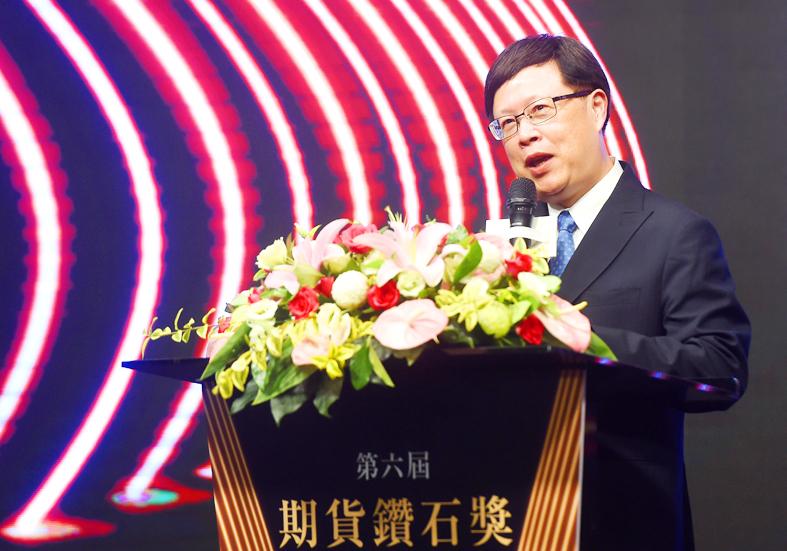Eleven domestic financial institutions have registered as members of a new over-the-counter (OTC) derivatives clearing business that the Taiwan Futures Exchange (TAIFEX) launched on Monday last week to bolster the resilience of the financial system and align with international supervision trends, the exchange said.
The 11 financial institutions are CTBC Bank (中信銀行), Yuanta Commercial Bank (元大銀行), Taipei Fubon Commercial Bank (台北富邦銀行), Bank SinoPac (永豐銀行), SinoPac Securities Co (永豐金證券), E.Sun Commercial Bank (玉山銀行), Taiwan Cooperative Bank (合庫銀行), Cathay United Bank (國泰世華銀行), Chang Hwa Commercial Bank (彰化銀行), Shin Kong Commercial Bank (新光銀行) and Bank of Taiwan (臺灣銀行), the exchange said.
Over-the-counter transactions are deals that take place outside the exchange. Usually, the transactions are negotiated between financial institutions, or conducted by brokers as an intermediary between buyers and sellers. Brokers usually ask potential buyers or sellers their acceptable prices and trading conditions by telephone or the Internet and seek to facilitate the deals, with buyers and sellers bearing the credit and default risks themselves.

Photo courtesy of Taiwan Futures Exchange
However, OTC derivatives transactions are complex and provide high financial leverage. For buyers and sellers, when one party defaults, it might trigger a domino effect and affect the stability of the financial market, the exchange said, citing the 2008 global financial crisis as an example that was caused by investments in complex derivatives by international financial institutions and eventually created systemic risks for global financial markets.
By establishing central clearing mechanisms for OTC derivatives, the risk of trading defaults can be transferred to the TAIFEX, and the original creditor-debtor relationship between buyers and sellers would become the relationship between the exchange and the buyers or sellers, it said.
In so doing, traders no longer need to face various counterparties with different risks, but only need to face the TAIFEX, which can simplify risk management operations and reduce costs.

Photo: Chien Jung-feng, Taipei Times
Moreover, the risks of each participant’s long and short positions in multiple transactions would offset each other, leaving only a single net position with the TAIFEX, which can reduce the total exposure of credit risks, it added.
The TAIFEX said it evaluates the value of each contract based on the market price every day, and its central clearing mechanism can handle profit-and-loss payments and implement risk management.
As a result, the risk status of each participant can be grasped in real time and alerted in advance, it said.
Even if a party defaults, the exchange’s financial defense pool can absorb the shock, and prevent the risk from continuing to expand and trigger a financial crisis, it added.
According to the regulations of the Financial Supervisory Commission, only 2 percent of the risk weight is required for financial institutions when calculating the accrued capital for the counterparty credit risk after conducting TAIFEX clearing.
Therefore, it can effectively reduce financial institutions’ capital accrual while improving their efficiency of fund utilization, the exchange said.
Moreover, in the past, domestic financial institutions usually conducted central clearing through foreign settlement institutions such as the London Clearing House, and the fees were very high, it said.
The exchange’s OTC central clearing mechanism hence allows transactions to be handled domestically, which provides financial institutions more convenience along with lower operating costs, it added.
The clearing mechanism is the central nervous system of a nation’s financial market. To ensure control over the core technologies behind Taiwan’s financial market, the TAIFEX independently developed the clearing system by integrating 15 modules rather than purchasing one, it said.
Only by ensuring smooth clearing and settlement can Taiwan build confidence in trading and allow the market to flourish, the TAIFEX said, adding that the OTC central clearing mechanism would ensure the safety of people’s transactions and reduce the financial industry’s operating costs, as well as create a favorable trading and hedging environment in the nation.
Overall, the establishment of the new OTC central clearing mechanism is expected to provide more convenience for market participants, boost the resilience of the financial system, attract foreign capital to the local market and enhance Taiwan’s international visibility, the exchange said.
The TAIFEX has been seeking accreditation as a qualified central counterparty in the US, the EU, the UK and Canada to attract foreign capital and enhance the domestic market’s international competitiveness, it said.
In addition to the launch of the new OTC derivatives clearing business on Monday, TAIFEX also organized charity activities on the same day to fulfill its corporate social responsibility. Witnessed by Premier Su Tseng-chang (蘇貞昌) and Financial Supervisory Commission Chairman Thomas Huang (黃天牧), TAIFEX chairman Wu Tzu-hsin (吳自心) made donations totaling NT$3 million (US$100,207) on behalf of the exchange to six organizations in an effort to help disadvantaged groups such as the physically and mentally handicapped, older people with dementia, single-parent families and people with rare diseases.
The TAIFEX also hopes to shrink the gap between urban and rural areas, extend its attention to art and cultural organizations in remote areas, and encourage more enterprises to jointly build a more inclusive society and achieve sustainable development.

Vincent Wei led fellow Singaporean farmers around an empty Malaysian plot, laying out plans for a greenhouse and rows of leafy vegetables. What he pitched was not just space for crops, but a lifeline for growers struggling to make ends meet in a city-state with high prices and little vacant land. The future agriculture hub is part of a joint special economic zone launched last year by the two neighbors, expected to cost US$123 million and produce 10,000 tonnes of fresh produce annually. It is attracting Singaporean farmers with promises of cheaper land, labor and energy just over the border.

US actor Matthew McConaughey has filed recordings of his image and voice with US patent authorities to protect them from unauthorized usage by artificial intelligence (AI) platforms, a representative said earlier this week. Several video clips and audio recordings were registered by the commercial arm of the Just Keep Livin’ Foundation, a non-profit created by the Oscar-winning actor and his wife, Camila, according to the US Patent and Trademark Office database. Many artists are increasingly concerned about the uncontrolled use of their image via generative AI since the rollout of ChatGPT and other AI-powered tools. Several US states have adopted

KEEPING UP: The acquisition of a cleanroom in Taiwan would enable Micron to increase production in a market where demand continues to outpace supply, a Micron official said Micron Technology Inc has signed a letter of intent to buy a fabrication site in Taiwan from Powerchip Semiconductor Manufacturing Corp (力積電) for US$1.8 billion to expand its production of memory chips. Micron would take control of the P5 site in Miaoli County’s Tongluo Township (銅鑼) and plans to ramp up DRAM production in phases after the transaction closes in the second quarter, the company said in a statement on Saturday. The acquisition includes an existing 12 inch fab cleanroom of 27,871m2 and would further position Micron to address growing global demand for memory solutions, the company said. Micron expects the transaction to

A proposed billionaires’ tax in California has ignited a political uproar in Silicon Valley, with tech titans threatening to leave the state while California Governor Gavin Newsom of the Democratic Party maneuvers to defeat a levy that he fears would lead to an exodus of wealth. A technology mecca, California has more billionaires than any other US state — a few hundred, by some estimates. About half its personal income tax revenue, a financial backbone in the nearly US$350 billion budget, comes from the top 1 percent of earners. A large healthcare union is attempting to place a proposal before